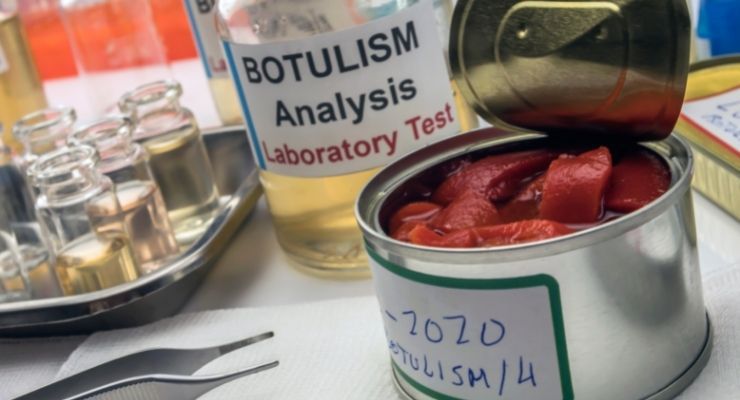
Botulism is a rare but well-known food poisoning illness caused by the bacterium Clostridium botulinum. Symptoms are severe and, if left untreated, can lead to paralysis and be fatal.
C. botulinum can be found in water, sediments, dust, soil, animal carcasses, and on plants. The illness results from a potent neurotoxin that comes in various forms and is produced as vegetative cells grow. In Australia, there have been periodic outbreaks of botulism in cattle, but human cases of food poisoning are rare.
If ingested, symptoms usually appear about 12 – 36 hours later, but in rare cases, can take up to 10 days. Symptoms include diarrhoea, nausea, and vomiting, dry mouth, vertigo with neurological symptoms, such as muscle weakness, appearing soon after. Infant botulism is when the bacteria develops in the intestines of babies under a year old and then releases the toxin.
In developed countries, the most common form is infant botulism. But cases relating to food still occur, and it is essential that food businesses are aware of the causes of the illness and how to prevent cases.
C. botulinum grows in conditions with low oxygen, where foods are not refrigerated and don’t contain preservatives. Generally, these conditions are most common when food is bottled, canned, or vacuum-packed, and in traditional and fermented foods.
There have been numerous international reports of under-processed foods, produced commercially or homemade, causing the illness. These tend to be items such as fermented vegetables and fish or improperly canned food. Recent outbreaks in the USA have come from garlic in oil and potatoes baked in foil.
The toxins can be destroyed by heating. So, particular vigilance is needed for foods that typically are not heated before consumption, such as bottled or tinned fish, vegetables, seafood, and meat spreads.
First, cleanliness is essential. You should already be washing hands with soap and water and drying thoroughly before handling food. Likewise, maintain a clean kitchen and equipment.
Take particular care if you prepare bottled or vacuum-packed food. These include products such as smoked or salted meats, fermented food, and fish products. The addition of nitrites and nitrates reduce the growth of C. botulinum. Also, ensure that new bottles and jars are used and that they have been sterilized.
When canning or preserving foods, attention should be paid to temperature, hygiene, pressure, and storage. If making a preserve, it is advised to only used acidic fruits such as apples, pears, berries, and stone fruits.
Although commercial production puts goods through a pressure cooker for a set time and temperature, in very rare cases, the bacterium can survive. Therefore, if food is being prepared using commercially canned goods, keep an eye out for bulges, leaking, or any damage. Another sign something is wrong is if the food spurts liquid or foam when opened; the food is discolored, moldy, or smells bad.
It is recommended that children under 12 months avoid honey as it may contain spores and be a source of infection.
Botulism is rare in developed countries, but it does still occur. It is essential to follow the food safety standards, your food safety program, including cleanliness procedures, and remain vigilant at all times.
Article written by: Food Safety Select
Looking for a food safety consultant or food analyst? You can search our trusted network here.
As a food business owner, you understand the impor...
View MoreFoodborne illness is a significant concern for Aus...
View MoreThe food industry is no stranger to the threat of ...
View MoreAs a food business owner, it's crucial to ensu...
View More_1.png)